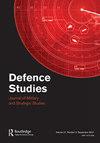From context to concept: history and strategic environment for NATO’s 2022 strategic concept
Q1 Arts and Humanities
引用次数: 2
Abstract
ABSTRACT This article introduces ten essays capturing ten panel discussions held by the Department of Social Sciences at the United States Military Academy on 3-4 February 2022, in support of the drafting of NATO’s 2022 Strategic Concept. While the shadow of the Russo-Ukrainian war hung heavy over the proceedings, participants sought to take both a long and a broad view, contemplating NATO’s role in a changing international order. NATO allies must assimilate these changes into their collective and national strategies, but they are first and foremost agents themselves, whose strategies can and should shape the future. The participants asked challenging questions about what international order(s) might look like in the proximate future, and how NATO allies could shape that proximate future. The authors of this introductory essay contend that while simultaneous competition with China and Russia will be a (perhaps the) central feature of the international security landscape for years to come, the act of competing does not a Strategic Concept make. Allies must grapple with interrelated issues ranging from the evergreen question of transatlantic burden-sharing to the assimilation of emerging technologies into strategic and operational planning. The transatlantic security architecture anchored by NATO will have to be incorporated into a broader, global security network to manage competition with China and Russia while holding fast to the democratic values that are at NATO’s heart.从背景到概念:北约2022年战略概念的历史与战略环境
摘要本文介绍了10篇文章,这些文章记录了社会科学系于2022年2月3日至4日在美国军事学院举行的十次小组讨论,以支持北约2022年战略构想的起草。尽管俄乌战争的阴影笼罩着整个进程,但与会者试图从长远和广泛的角度思考北约在不断变化的国际秩序中的作用。北约盟国必须将这些变化纳入其集体和国家战略,但他们自己首先是代理人,他们的战略能够也应该塑造未来。与会者提出了一些具有挑战性的问题,比如在不久的将来国际秩序会是什么样子,以及北约盟国如何塑造不久的未来。这篇介绍性文章的作者认为,尽管与中国和俄罗斯同时竞争将是未来几年国际安全格局的一个(也许是)核心特征,但竞争行为并不是战略概念。盟国必须努力解决相互关联的问题,从跨大西洋负担分担的长期问题到将新兴技术纳入战略和行动规划。以北约为基础的跨大西洋安全架构必须纳入更广泛的全球安全网络,以管理与中国和俄罗斯的竞争,同时坚守北约核心的民主价值观。
本文章由计算机程序翻译,如有差异,请以英文原文为准。
求助全文
约1分钟内获得全文
求助全文

 求助内容:
求助内容: 应助结果提醒方式:
应助结果提醒方式:


